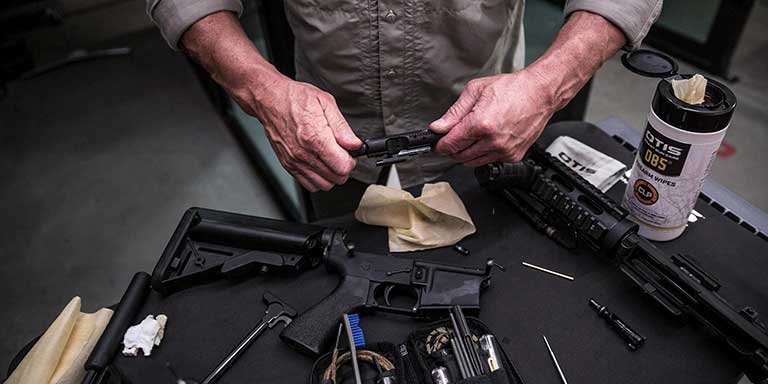Welcome to the world of firearm maintenance for law enforcement and security professionals! In this article, you will learn the importance of regular firearm upkeep, including cleaning, lubrication, and inspection. By taking good care of your firearm, you can ensure its reliable performance when you need it most. Whether you are a police officer, security guard, or armed civilian, proper maintenance is essential for keeping yourself and others safe. Let’s dive in and explore the best practices for preserving the functionality of your firearm. Have you ever wondered how to properly maintain your firearm as a law enforcement officer or security professional? In this guide, we will walk you through the essential steps to keep your weapon in top condition, ensuring its reliability and performance when you need it most.
Importance of Firearm Maintenance
Knowing how to maintain your firearm is crucial as a law enforcement officer or security professional. A well-maintained weapon can mean the difference between life and death in a critical situation. Regular maintenance not only ensures the functionality of your firearm but also prolongs its lifespan.
Ensuring that your firearm is in optimal condition should be one of your top priorities, as it directly affects your ability to perform your duties effectively and keep yourself and others safe.
Cleaning Your Firearm
Proper cleaning is a fundamental aspect of firearm maintenance. Regular cleaning removes residue, dirt, and debris that can affect the function of your weapon. It also prevents corrosion and rust, which can deteriorate the metal components of your firearm over time.
When cleaning your firearm, make sure to disassemble it according to the manufacturer’s guidelines. Use a solvent and cleaning brush to remove fouling and deposits from the barrel, slide, and other parts of the gun. Be thorough but careful not to damage any components during the cleaning process.
After cleaning, remember to lubricate your firearm with a high-quality gun oil or lubricant. This helps reduce friction between moving parts and ensures smooth operation when firing your weapon.
Inspecting Your Firearm
Regular inspections are essential to catch any issues with your firearm before they escalate into major problems. Inspect your weapon for signs of wear, damage, or malfunction after each use or at least once a month, depending on how frequently you use it.
Check the barrel for any obstructions or damage, inspect the slide for proper function, and examine the trigger mechanism for any issues. Ensure that all screws and pins are tight and secure, and that there are no cracks or dents in the frame or slide.
If you notice any issues during your inspection, address them immediately. Do not use a firearm that is not in proper working condition, as it can be dangerous and unreliable in a critical situation.
Handling Ammunition Safely
Proper handling and storage of ammunition are just as important as maintaining your firearm. Improperly stored ammunition can become unstable and dangerous to use. Always keep your ammunition in a cool, dry place away from heat and moisture.
Inspect your ammunition regularly for signs of damage, corrosion, or deformation. Do not use ammunition that appears to be compromised, as it can result in misfires or malfunctions when firing your weapon.
When loading your firearm, make sure to use the correct caliber and type of ammunition recommended by the manufacturer. Using the wrong ammunition can cause severe damage to your gun and pose a risk to yourself and others.
Safe Storage of Your Firearm
Proper storage of your firearm is essential to prevent accidents and unauthorized access. As a law enforcement officer or security professional, you have a responsibility to keep your weapon secure at all times, whether at home or on duty.
Invest in a gun safe or lockbox to store your firearm when not in use. Make sure that the safe is made of sturdy materials and equipped with a reliable locking mechanism to prevent theft or unauthorized access.
When carrying your firearm on duty, always use a secure holster that fits your weapon properly and provides adequate retention. Ensure that the holster protects the trigger guard to prevent accidental discharges and keeps your firearm accessible in a comfortable position.
Training and Skill Development
Regular training and skill development are essential for law enforcement officers and security professionals to maintain proficiency with their firearms. Practice shooting drills, target practice, and scenario-based training to improve your accuracy, speed, and decision-making under pressure.
Familiarize yourself with the operation of your firearm and practice proper handling techniques regularly. Stay up to date on the latest developments in firearms technology and tactics to enhance your skills and stay ahead of potential threats.
Attend training courses and seminars offered by reputable instructors and organizations to expand your knowledge and expertise in firearm maintenance and usage. Continuous learning and improvement are key to becoming a competent and effective law enforcement officer or security professional.
Conclusion
Proper firearm maintenance is a crucial aspect of being a law enforcement officer or security professional. By following these essential steps, you can ensure that your weapon is always in optimal condition, ready to perform when you need it most. Remember to clean, inspect, and store your firearm correctly, and to stay current on training and skill development to maintain your proficiency as a responsible gun owner. Your safety and the safety of others depend on your dedication to maintaining your firearm.

